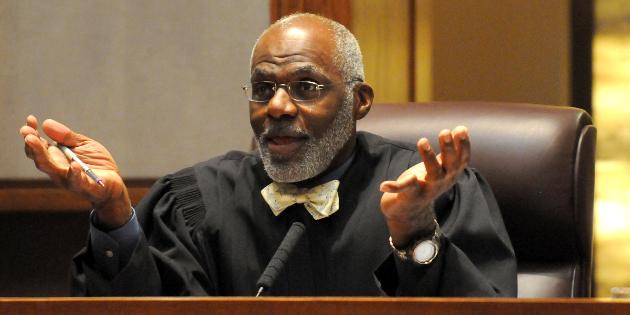Look who’s in the news!
January 5th, 2018

Yes, we all know that Mike Bull wrote most of the energy law now in place! But there’s no mention of those many years of work at House Regulated Industries Committee though…
And we all know that there are some big holes and problems with the wind siting statutes, rules, and standards. What will it take to get some of the problems worked through, like some respectful wind siting standards? We’re just starting to see, at long last, after years and years of complaints, some Public Utilities Commission action on wind noise issues.
Bent Tree_Noise Monitoring and Monitoring Report_20179-135856-01
Siting will have to be addressed, because despite sound modeling that says “no problem,” there are indeed problems. Despite shadow flicker modeling that says “no problem,” there are indeed problems.
Preventative siting is long overdue and needs to start NOW! And what about those already affected? “Buy the Farm” for wind? It’s overdue. Action after the fact is not the best of options, prevention is always the key, but for those now attempting to live in untenable circumstances, foisted on them by the nuisance moving into their community, and permitted by the Commission, what are the options?
Wind project in southern Minnesota gets pushback
Hey Mikey, how ’bout helping get to some solutions???
Buy the Farm — A Win For The Home Team!
May 29th, 2013
Today we had a rulemaking Advisory Committee meeting about Public Utilities Commission rules for Certificate of Need proceedings. More on that later, because at 10:00 a.m. the Minnesota Supreme Court decision on Buy the Farm was released (Buy the Farm, Minn. Stat. 216B.12, Subd. 4, is a statutory provision where landowners can force a utility to condemn their whole parcel, rather than just a narrow easement and let them get out from living under a transmission line), and oh what a decision. Kudos to Jerry Von Korff, who was at the rulemaking meeting, and his cohort Igor Lenzner, also Michael Rajkowski and Sarah Jewell, the attorneys who brought the appeal, plus Rod Krass/Kirk Schnitker and yours truly on Amicus. It was a win for landowners, homeowners, farmers, business owners, for everyone who has transmission condemnation/eminent domain cases pending, this one’s for YOU!
It really doesn’t get much better than this.
Bottom line on minimum compensation? Landowners are entitled to minimum compensation:
Appellants who elected to require utilities to condemn their entire properties in fee pursuant to Minn. Stat. § 216E.12 (2012) are entitled to minimum compensation under Minn. Stat. § 117.187 (2012) as owners who “must relocate” because on the date of the taking, the utilities took title to and possession of appellants’ entire properties.
… and …
Accordingly, we must determine whether appellants were required to relocate at the time their properties were taken. Because NSP initiated quick-take condemnation proceedings, the time of the takings with respect to appellants’ properties was when title to and possession of the property passed to NSP. See Moorhead Econ. Dev. Auth., 789 N.W.2d at 874 (explaining that “the date of the taking” in a quick-take condemnation proceeding is when “the transfer of title and possession” occurs, which is “well before the commissioners file their award”). It is undisputed that by the time title to and possession of appellants’ properties passed to NSP, appellants had made their elections under Minn. Stat. § 216E.12, subd. 4, which by operation of the statute, automatically converted the easements sought into fee takings. See Minn. Stat. § 216E.12, subd. 4 (explaining that at the time the property owner makes an election, “the easement interest over and adjacent to the lands designated by the owner to be acquired in fee . . . shall automatically be converted into a fee taking”). It follows that, at the time of the takings, NSP took title to and possession of appellants’ entire properties in fee. Therefore, we conclude that appellants were owners under Minn. Stat. § 117.187 who, at the time the takings occurred, “must relocate.” Accordingly, they are entitled to minimum compensation.
Bottom line on relocation benefits? Landowners are entitled to relocation benefits:
Because appellants are “displaced persons” under federal law, they are entitled to relocation assistance under Minn. Stat. §§ 117.50-.56 (2012).
… and…
Because appellants are required to relocate permanently, they do not fall within the exemption in 49 C.F.R. § 24.2(a)(9)(ii)(D). Therefore, because we conclude that appellants satisfy the definition of “displaced persons” under 42 U.S.C. § 4601(6)(A)(i)(I) and do not fall within any exemptions to that definition, we hold that appellants are entitled to relocation assistance under Minn. Stat. §§ 117.50-.56.
The decision was written by Justice Alan Page (photo from StarTribune www.startribune.com):
Yes, when he’s not wearing a football uniform, he’s the guy who is ALWAYS seen wearing one of his many classic “Jacobsen” bow ties, standing up for the public interest and the people of Minnesota. For him to be in the spot where he is, to do the work he’s doing, a long strange trip for a football player (sort of like it was for a truckdriver, eh?), with some good mentoring along the way.

This decision is something I’ve been working for, and toward, since I first got involved with the Chisago Transmission Project so long ago, and folks, that’s 17 years now…
Now and then, some event rates an “OH HAPPY DAY!” and this is the best of all, so this time from Aretha… OH HAPPY DAY!!!
From the St. Cloud Times:
The decision by the state’s highest court overturns a Court of Appeals decision and affirms the ruling by Stearns County District Court Judge Frank Kundrat that had been overturned by the Court of Appeals.
The Supreme Court ruling hinged on whether property owners who chose to require CapX to condemn their property would receive that compensation or whether those property owners chose to move from their property and therefore aren’t entitled to the compensation.
Read the rest of this entry »
SF 183! Call or email Senate Judiciary today!
January 31st, 2013
Sen. Kevin Dahle has introduced SF 183, a bill that addresses the problems landowners are encountering with our good friends at Xcel Energy when they attempt to elect the “Buy the Farm” option. See Minn. Stat. 216E.12, Subd. 4. Buy the Farm gives landowners the option of requiring condemnation of their entire parcel, which means they can get out from under the transmission line. Xcel Energy, on the other hand, is doing everything it can to prevent landowners from electing Buy the Farm (click here for prior “Buy the Farm” posts).
I’d guess that Rep. David Bly will introduce this on the House side. Keep your eyes open.
Next steps – first email Sen. Kevin Dahle with a BIG thank you! sen.kevin.dahle@senate.mn
Then send emails and call the Senate Judiciary Committee, where it’s been sent for its first committee hearing — there’s only 8 members so it won’t take long:
Then contact your own state Senator and Representative and let them know SF 183 Buy the Farm needs their support.
Will keep you posted on other Buy the Farm developments. This bill is a good start to the 2013 session!
Wind developer hush money for wind noise?
August 1st, 2010
Word of today’s NYT article came in over the wire today, and it’s an interesting concept to deal with a very real problem, but not nearly enough!!!
My clients raising noise issues in wind project dockets at the PUC, including the “Public Health Impacts of Wind Turbines” (09-845) have noted, “how will we be compensated for having to live with all this noise?” In our capitalist culture, $$$ is compensation. Offensive projects aren’t shut down, money is offered.
Minnesota Noise Rules don’t take into account ambient noise, they just set standards for noise, a binary limit on certain types of noise.
Minnesota’s legislature acknowledged that people don’t want to live by transmission lines, and enacted “Buy the Farm” (in full, below)which gives landowners facing a transmission line on their property can opt out, and force the utility to buy their full parcel, not just an easement. Why not the same with wind projects?
Here’s the actual waiver that the wind developer is asking them to sign:
And check this sentence, regarding the Compensation which is outlined in “Exhibit C” attached to the agreement:
Exhibit C shall be redacted from the recorded version of this agreement.
It seems to me that for the blanket “right to offend,” the offers reported are way too low, and waivers are one-sided. From the article:
Don’t change the market price? Well, that says there’s a price and that there’s a market. Caithness does not control the market — they’d better get clear on that right quick. I’ would presume that as this becomes more of an issue the price will go up! LET THE MARKET DECIDE!!! I love it when that happens…
+++++++++++++++++++++++++++++++++++++++++++++++++
Minnesota’s “Buy the Farm” law:
Minn. Stat. 216E.12, Subd. 4.Contiguous land.

